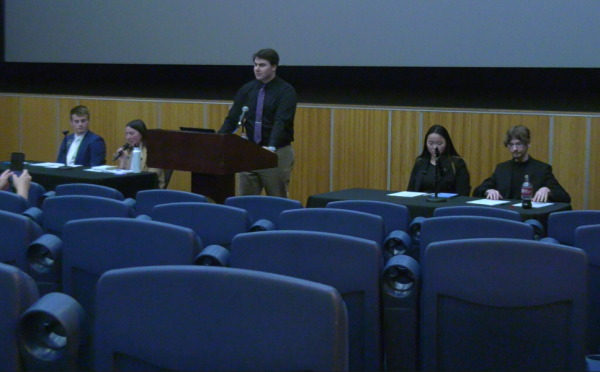Declining enrollment creates savings account derth
Senate’s spendy culture causes surplus account to ‘vanish’
February 11, 2015
Students will pay $40 more next year in student fees after Student Senate raised rates to compensate for declining student enrollment and even an $84,000 rainy day fund deficit.
Senate voted to raise segregated fees to $479 next school year to offset a drop in enrollment and less collected segregated fees in the 2014-15 school year.
Senate sets segregated fees — which fund the annual organized activity budget — based on projected enrollment numbers. Enrollment numbers were lower than expected this year, which created an $84,000 deficit in Senate’s reserve account, Christian Paese, finance director, said.
Paese said like any prediction, even the best can be wrong. In this case, the enrollment drop left them paying more out in previously allocated fees than they had collected.
“We go off of our best estimate, based on the information we have, based on what we know to be true,” Paese said. “It doesn’t have anything necessarily to do with the way we’re doing it. We’re trying to do the best we can with the information we have.”
Paese said Senate has already put a $28,000 dollar special reserve line item in next year’s segregated fee budget, which after three years could bring the balance back to zero.
Senate’s reserve account can sink into the red, Paese said, both because Senate has other accounts which run positive balances and because the UW System, can borrow and replace money over time.
Jacob Wrasse, student body vice president, said the segregated fee account now has the lowest carryover in more than five years. In 2008, the account balance peaked at $933,071 in cash surplus.
Wrasse said since that time, Senate used the money to prevent segregated fees from increasing and funding special, one-time allotments of money for organizations and projects on campus.
He said once Senate reached a reasonable carryover level, the lingering mentality to “spend down” the account, plus a sudden drop of enrollment caused the rest of the money to “vanish under our feet.”
“The intention was, and remains, to have as low or neutral a seg (segregated) fee increase as possible,” Wrasse said. “In that spirit this account got depleted all the way.”
Both Wrasse and Paese said that they are looking at different ways to provide segregated fees to all the organizations that request them, including examining what positions and programs the fees fund otherwise, not providing full allocations and developing a plan to use the carryover left in organizations accounts if they do not use the full allocation.










